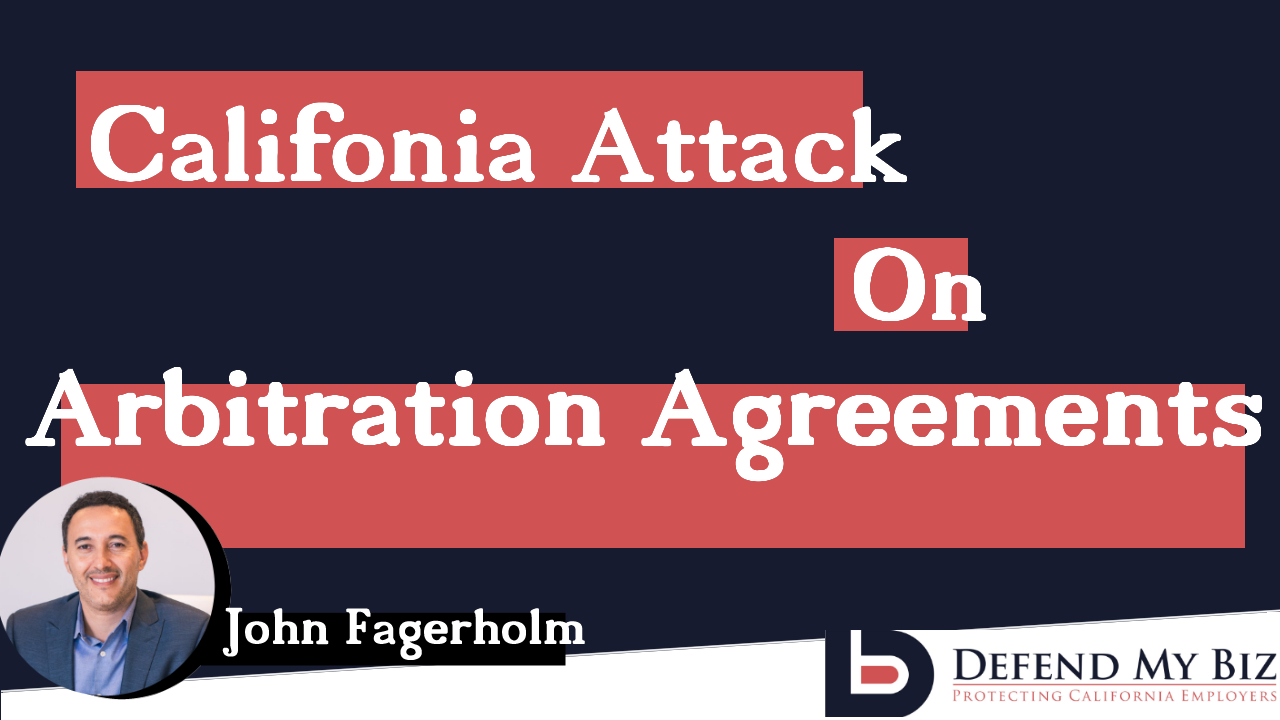
Posted on May 7th, 2019
Below is a complete transcript of the video.
What’s going on, fellow entrepreneurs? This is John Fagerholm coming to you from Metal Law Group.
And today I want to talk about arbitration agreements.
So in the old days, arbitration agreements used to be the last line of defense for employers.
Basically, it was less expensive to litigate. You had a judge or some sort of trained attorney arbitrating this.
So all of the emotion that comes from the jury was kind of taken out of it. And there used to be a time when everybody would … you could agree in the arbitration agreement that everybody paid their own attorney’s fees. Those were great days.
But, over the years, California sort of diminished the power of arbitration agreements. So people ask me, “Well, why should we even do arbitration agreements anymore?”
Well, I don’t think they’re as good as they used to be back in the day, but at, but at least it still gives you choice.
That’s why I still like them. So imagine if it’s a straight wage an hour claim. The employee’s claiming you didn’t pay over time and so on and so forth.
Well a case like that, it makes more sense just to litigate it cause it’s just numbers anyway, right? It’s what can you prove that I didn’t pay and what can I prove that I paid?
So in a case like that, I would probably suggest letting it stay in the superior court because, assuming that you have an arbitration agreement in place.
Of course, you don’t get to choose whether you’re in arbitration or you’re in superior court.
What happens is you have an arbitration agreement in place and if the other side doesn’t trigger the arbitration agreement, then you can decide and they filed a claim in the superior court or somewhere else.
You can decide that you want to stay in that venue even though there’s an arbitration agreement or if you think that its better for you to arbitrate, you can trigger the arbitration group. Sorry for that sidetrack. So what was I saying?
I was saying that in a case like that, in a case where it just wages an hour and there isn’t much emotion that can come from the jury, I’d probably just stay in superior court because it’s likely a less expensive anyway.
If it was something that would be emotional, like sexual harassment, something like that, then I’d probably want to do it in front of an arbitrator, because then there wouldn’t be the emotion of the jury.
Now the problem with arbitration agreements is that when you arbitrate since you as the employer are required to pay all of the costs, it can be expensive.
I think the typical arbitration cost is about $60,000. So not that superior court is less expensive, but the fees for the superior court are less expensive and superior court, it takes a lot more to litigate, but it’s over several months.
With an arbitration agreement, you’re litigating and you’re paying for that. And then when it comes time to actually be heard and arbitrate, you’ve got to pay an arbitration fee. And that usually comes up around 60,000.
So the reason why I think they’re good for, even though the cost is high, the reason why I think that they’re good for something like sexual harassment is you take the emotion out of it.
And even though you have to pay 60,000 as the arbitration fee, the arbitrator is less likely to come up with some crazy number that as a judgment, whereas a jury, especially in something like sexual harassment or discrimination or retaliation or those types of claims, they come up with some outrageous numbers.
Anyway, that’s my thought on arbitration agreements. If you don’t have one, I think you should. I don’t think you should download one off the internet because a lot of times they don’t even comply with California law and are useless.
If you’re sued by your employee and there is an arbitration agreement, look to see if it’s better to stay in superior court or to arbitrate.
If you have an arbitration agreement and they file for arbitration, then you may not have a choice anyway.
All right, everybody. Until next time.


